最新版新起点大学英语综合教程第一册unit2教案
- 格式:docx
- 大小:20.22 KB
- 文档页数:5
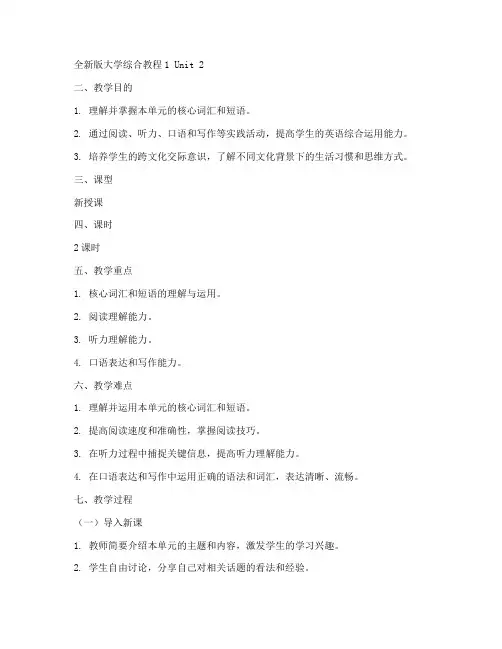
全新版大学综合教程1 Unit 2二、教学目的1. 理解并掌握本单元的核心词汇和短语。
2. 通过阅读、听力、口语和写作等实践活动,提高学生的英语综合运用能力。
3. 培养学生的跨文化交际意识,了解不同文化背景下的生活习惯和思维方式。
三、课型新授课四、课时2课时五、教学重点1. 核心词汇和短语的理解与运用。
2. 阅读理解能力。
3. 听力理解能力。
4. 口语表达和写作能力。
六、教学难点1. 理解并运用本单元的核心词汇和短语。
2. 提高阅读速度和准确性,掌握阅读技巧。
3. 在听力过程中捕捉关键信息,提高听力理解能力。
4. 在口语表达和写作中运用正确的语法和词汇,表达清晰、流畅。
七、教学过程(一)导入新课1. 教师简要介绍本单元的主题和内容,激发学生的学习兴趣。
2. 学生自由讨论,分享自己对相关话题的看法和经验。
(二)讲授新课1. 阅读理解(1)教师引导学生快速浏览文章,了解文章大意。
(2)学生分组讨论,分析文章结构、段落大意和关键信息。
(3)教师总结,讲解文章中的难句和重点词汇。
2. 听力理解(1)教师播放听力材料,学生听后回答问题。
(2)教师讲解听力技巧,指导学生如何捕捉关键信息。
(3)学生分组讨论,分享听力感受和收获。
3. 口语表达(1)教师引导学生围绕本单元主题进行口语练习。
(2)学生分组进行角色扮演,模拟真实场景。
(3)教师点评,指导学生如何提高口语表达能力。
4. 写作(1)教师讲解写作技巧,指导学生如何组织文章结构。
(2)学生根据教师提供的写作框架,完成写作任务。
(3)教师点评,指导学生如何提高写作能力。
(三)巩固练习1. 学生完成课后练习,巩固所学知识。
2. 教师选取部分练习进行讲解,帮助学生解决疑难问题。
(四)归纳小结1. 教师总结本单元所学内容,强调重点和难点。
2. 学生回顾所学知识,分享学习心得。
(五)作业布置1. 学生预习下一单元内容,为下一节课做好准备。
2. 完成课后练习,巩固所学知识。
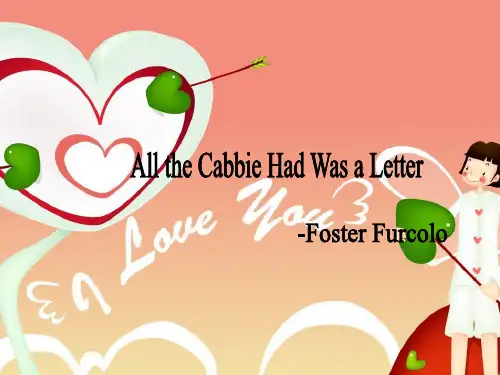

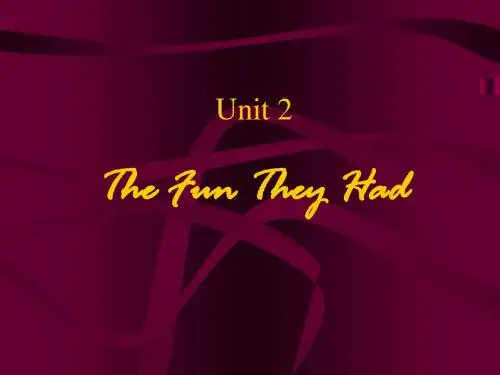
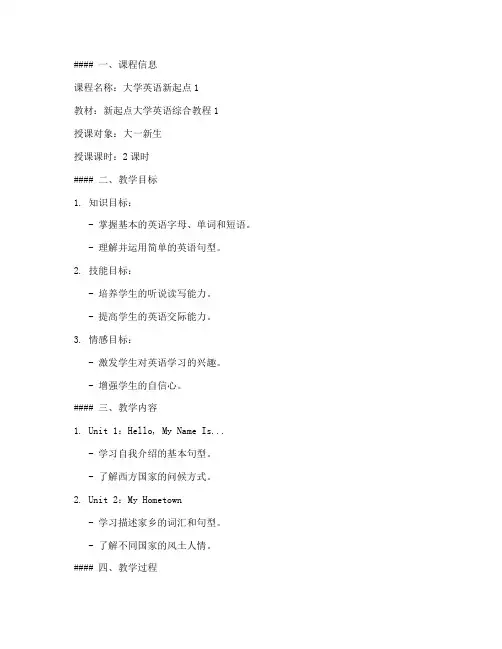
#### 一、课程信息课程名称:大学英语新起点1教材:新起点大学英语综合教程1授课对象:大一新生授课课时:2课时#### 二、教学目标1. 知识目标:- 掌握基本的英语字母、单词和短语。
- 理解并运用简单的英语句型。
2. 技能目标:- 培养学生的听说读写能力。
- 提高学生的英语交际能力。
3. 情感目标:- 激发学生对英语学习的兴趣。
- 增强学生的自信心。
#### 三、教学内容1. Unit 1:Hello, My Name Is...- 学习自我介绍的基本句型。
- 了解西方国家的问候方式。
2. Unit 2:My Hometown- 学习描述家乡的词汇和句型。
- 了解不同国家的风土人情。
#### 四、教学过程##### 第一课时(一)导入新课1. 课堂问候:教师用英语问候学生,营造轻松的学习氛围。
2. 热身活动:学生用英语进行简单的自我介绍,教师给予反馈。
(二)讲授新课1. 词汇教学:- 介绍本课的生词,如:name, hometown, introduce, interesting, famous 等。
- 通过图片、例句等方式帮助学生记忆单词。
2. 句型教学:- 讲解本课的句型,如:Hello, my name is...;My hometown is...;It's interesting/famous...- 通过角色扮演等方式让学生练习句型。
(三)巩固练习1. 听力练习:播放与本课内容相关的听力材料,让学生回答问题。
2. 口语练习:学生分组进行对话练习,描述自己的家乡。
(四)小结1. 回顾本课所学内容。
2. 强调重点词汇和句型。
##### 第二课时(一)复习导入1. 回顾上一节课所学内容。
2. 学生用英语描述自己的家乡。
(二)讲授新课1. 词汇教学:- 介绍本课的生词,如:weather, family, school, study等。
- 通过图片、例句等方式帮助学生记忆单词。
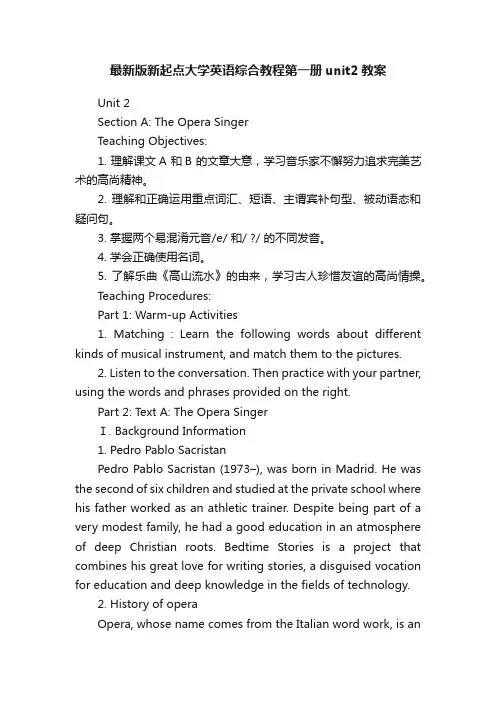
最新版新起点大学英语综合教程第一册unit2教案Unit 2Section A: The Opera SingerTeaching Objectives:1. 理解课文A 和B 的文章大意,学习音乐家不懈努力追求完美艺术的高尚精神。
2. 理解和正确运用重点词汇、短语、主谓宾补句型、被动语态和疑问句。
3. 掌握两个易混淆元音/e/ 和/ ?/ 的不同发音。
4. 学会正确使用名词。
5. 了解乐曲《高山流水》的由来,学习古人珍惜友谊的高尚情操。
Teaching Procedures:Part 1: Warm-up Activities1. Matching:Learn the following words about different kinds of musical instrument, and match them to the pictures.2. Listen to the conversation. Then practice with your partner, using the words and phrases provided on the right.Part 2: Text A: The Opera SingerⅠ. Background Information1. Pedro Pablo SacristanPedro Pablo Sacristan (1973–), was born in Madrid. He was the second of six children and studied at the private school where his father worked as an athletic trainer. Despite being part of a very modest family, he had a good education in an atmosphere of deep Christian roots. Bedtime Stories is a project that combines his great love for writing stories, a disguised vocation for education and deep knowledge in the fields of technology.2. History of operaOpera, whose name comes from the Italian word work, is anart form in which singers and musicians perform a dramatic work combining text and musical score, usually in a theatrical setting. Opera is part of the Western classical music tradition. It started in Italy at the end of the 16th century and soon spread throughout the rest of Europe.Ⅱ. Words and phrases1. mattera. v. be important 有关系;要紧What does it matter whether he comes or goes? 他是来是去,又有什么关系呢?b. n. affair, topic or situation being considered 事情;问题;情况It’s no laughing matter. 这可不是闹着玩的。
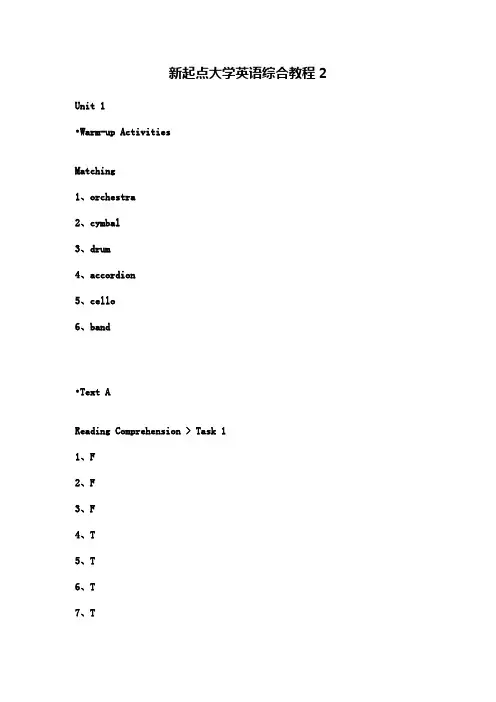
新起点大学英语综合教程2 Unit 1•Warm-up ActivitiesMatching1、orchestra2、cymbal3、drum4、accordion5、cello6、band•Text AReading Comprehension > Task 11、F2、F3、F4、T5、T6、T7、TReading Comprehension > Task 21、practice a lot2、bother other people3、sound cannot travel in space because there is no air4、a big glass ball connected to a machine which sucked out all the air inside5、proposed that she form part of a unique space journeyVocabulary & Structure > Task 11、e2、f3、g4、c5、d6、a7、b8、j9、h10、iVocabulary & Structure > Task 21、obstacle2、solution3、respectful4、crash5、achieved6、astronaut7、proposed8、bother9、documentary10、uniqueVocabulary & Structure > Task 3 1、musicmusicals2、slovesolution3、respectfulrespectable4、documentarydocument5、bother (v.)bother (n.)Vocabulary & Structure > Task 41、painful2、colorful3、helpful4、hopeful5、cheerfulVocabulary & Structure > Task 51、B2、C3、D4、C5、CVocabulary & Structure > Task 61、她知道敲击鼓钹的声音真的会使老人们心情烦躁。
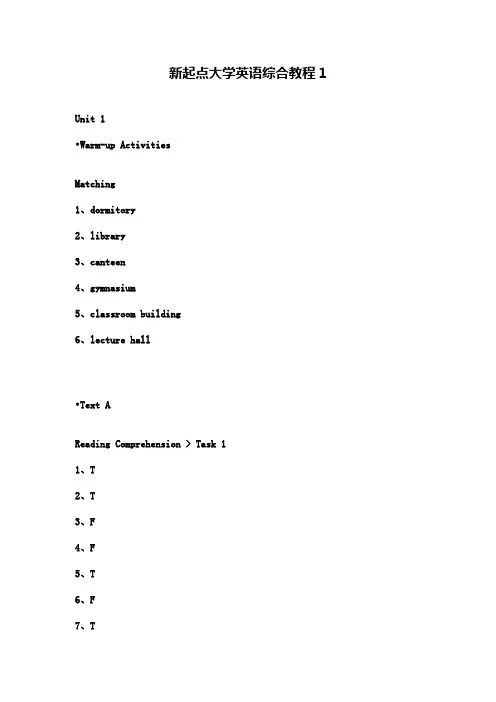
新起点大学英语综合教程1 Unit 1•Warm-up ActivitiesMatching1、dormitory2、library3、canteen4、gymnasium5、classroom building6、lecture hall•Text AReading Comprehension > Task 11、T2、T3、F4、F5、T6、F7、TReading Comprehension > Task 21、examsscholarships2、remain a cherished memory3、surprisedhave in common4、how incredible your parents really are5、full, exciting, challenge-laden, and stressful fun and unforgettableVocabulary & Structure > Task 11、c2、j3、g4、a5、i6、e7、d8、f9、b10、hVocabulary & Structure > Task 21、genuine2、cherished3、explore4、incredible5、survived6、voluntarily7、consequences8、expand9、energetically10、leisureVocabulary & Structure > Task 3 1、survivedsurvival2、energeticallyenergetic3、voluntarilyvolunteer4、cherishcherished5、societysocialVocabulary & Structure > Task 41、unequal2、informal3、unable4、incapable5、uncomfortableVocabulary & Structure > Task 51、B2、C3、B4、D5、AVocabulary & Structure > Task 61、……你正躺在下铺,毫无压力。
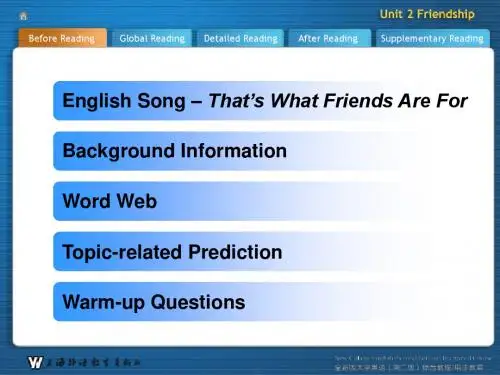
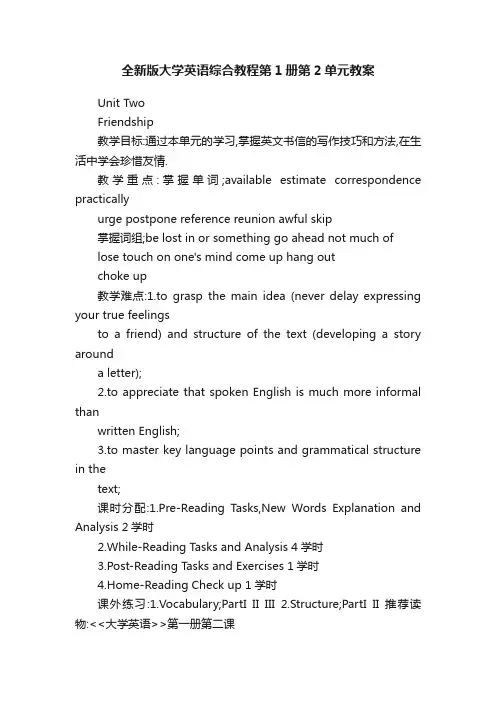
全新版大学英语综合教程第1册第2单元教案Unit TwoFriendship教学目标:通过本单元的学习,掌握英文书信的写作技巧和方法,在生活中学会珍惜友情.教学重点:掌握单词;available estimate correspondence practicallyurge postpone reference reunion awful skip掌握词组;be lost in or something go ahead not much oflose touch on one's mind come up hang outchoke up教学难点:1.to grasp the main idea (never delay expressing your true feelingsto a friend) and structure of the text (developing a story arounda letter);2.to appreciate that spoken English is much more informal thanwritten English;3.to master key language points and grammatical structure in thetext;课时分配:1.Pre-Reading Tasks,New Words Explanation and Analysis 2学时2.While-Reading T asks and Analysis 4学时3.Post-Reading Tasks and Exercises 1学时4.Home-Reading Check up 1学时课外练习:1.Vocabulary;PartI II III 2.Structure;PartI II 推荐读物:<<大学英语>>第一册第二课教学过程:Study of the TextCulture NotesHalloween is celebrated annually. It is on the night of 31 October, when people once believed that ghosts could be seen. Now, in Britain and America, it is a time when children have parties, dress up as witches, make lanterns out of pumpkins from which the inside has been removed, and play "trick or treat'.Trick or treat is a traditional activity at Halloween. Children dress in costumes and visit houses. At each house they say "Trick or treat'. This means that they will play a "trick', or joke, on the people in the house unless they are given a "treat', e.g. sweets or money. Most people prefer to give treats rather than having tricks playedon them.Pre-reading tasks1.T asks Ss the following questions on the song That's What Friends are For;---What is a fair weather friend?(one who is happy to stay with you when things are going well but leaves as soon as trouble arrives)---According to the song, what are friends for?(for both good times and bad times) 2.Warm-up QuestionsDo you often write letters to friends?1)T writes down the following words on the blackboard: frequently, sometimes rarely, never.2)T invites several Ss to give reasons for writing or not writing letters.3)T sums up by saying: letters are the best in expressing our innermost feelings.3.Topic-related Prediction1)Before you read the story, think about the answers to the following questions.What does a cabbie do?What is a letter used for?Who wrote the letter to the cabbie?Why was all the cabbie had only a letter?2)Read the last sentence of Text A and try to guess what the story is about. While-reading tasks1.Read Text A as quickly as possible, and find out if you are right. Can you summarize the story with three sentences?key words: lost in thought, read a letter, an old friend, lifelong friendship, regret, author decided2.Scan the text and find out how many questions the narrator asked the cabbie and what were the latter's responses.----At first, did you mistake Ed for the writer of this letter?----Which round of question-and-answer leads to the mistake?(the second round)3.Ss do Text Organization exercise on page 40./doc/1714972056.html,nguage study and text analysis1)be lost in/lose oneself in:be absorbed in, be fully occupied withe .g: He was lost in playing computer games so he was unaware of my entering the room.I had lost myself in thought.2)available: able to be used, had, or reachede.g. Since 1990, the mount of money available to buy books has fallen by 17%.We have already used up all the available space.3)He sounded as if he had a cold or something: This sentence implies the sad state mind the taxi driver was in.or something: used when you are not very sure about what you have just saide.g. The air fare was a hundred and ninety-nine pounds or something.Here's some money. Get yourself a sandwich or something.4)go ahead: continue, begin(sometimes followed by with + n)e.g. The board of directors will vote today on whether to go ahead with theplan.Henry will be late but we will go ahead with the meeting anyway.5)know/learn by heart: memorize, remember exactlye.g. You have to know all the music by heart if you want to be a concertpianist.The pupils are required to learn a classic poem by heart every day.6)At least they do with me because I'm on the road so much: At least lettersfrom home mean a lot to me because I travel a lot in a car for long distances.7)estimate: form a judgement about (a quantity or value)e.g. I estimate that the total cost for the treatment of the disease will gofrom$5,000 to $8,000.Bill's personal riches were estimated at $368 million.8)This isn't family.: This isn't a letter from my family.9)might/may(just) as well: not have a strong desire to do and may even slightlyreluctant about somethinge.g. Anyway, you're here; you might as well stay.The post office is really busy --we'll have to queue for ages to getserved. We might as well go home.10)I'm not much of a hand at writing.: I am not good at writing.not much of a: not a goode.g. Some people may think that doing housework for others is not much of acareer.He is not much of a father, but he is an outstanding professor.11)keep up: continue without stoppinge.g.: They risk losing their homes because they can no longer keep up therepayments.I was so hungry all the time that I could not keep the diet up for longerthan a month.12)correspondence: a)the act of writing, receiving or sending letters(不可加s, often followed by with + n)e.g. His interest in writing came from a long correspondence with a close friend.b)the letters that sb. receives or sendse.g. Mary really never mentions her step-mother in her correspondence.13)But I take it he's someone...:But I expect that he issomeone...e.g.: I take it(that) you've heard that all the students in my class have done a very good job in CET Band 4.14)practically: almost, but not completely or exactlye.g.: He'd known the old man for practically ten years.I know people who find it practically impossible to give up smoking.15)Went to school together? The complete sentence is like this: You went to schooltogether?(In colloquial English a declarative sentence with a rising tone may serve as a question.)16)neighborhood: one of the parts of a town where people livee.g.: It seemed like an ideal neighborhood to raise my children in.Houses in a good neighborhood are likely to be sold at a high price.17)kind of/sort of:("kind of”is esp.AmE, "sort of' esp.BrE) a little bit, in some way or degree(used before v. or after a link verb)e.g.: She wasn't beautiful. But she was kind of cute.The boy's description kind of gives us an idea of what's happening.18)lose touch(with sb.):meet or contact sb. less and less often, gradually stop writing,telephoning, or visiting theme.g.: I lost touch with my former classmates after graduation.In my job one tends to lose touch with friends19)a couple of:(infml)a few, more than one but not manye.g. Do you have a moment? There are a couple of things I'd like to talk to youabout.They promised the students that they would find a substitute teacher in acouple of days.20)But I realized that Old Ed was still on his mind when he spoke again, almost moreto himself than to me.: But I realized that the taxi driver was still thinking ofOld Ed when he spoke again. It seemed that he spoke more to himself than to me.on one's mind: in one's thoughts; of concern to one(If something is on your mind,you are worried or concerned about it and think about it a lot.)e.g.: Dealings on the stock market have been on his mind all the time.This travel plan has been on my mind all week.21)keep in touch(with sb): write, phone, or visit each other regularlye.g. The old man kept in touch with his children while living in a nursing house.While doing the research work in the antarctic, the professor kept in touch with his students via email.22)come up: a)happen, occur, esp. unexpectedlye.g.: "Sorry, I am late----something came up at home.'b)be mentioned or discussede.g.: The term "Project Hope' has come up a lot recently in the newspapers.23)urge: try very hard to persuade(often used in the pattern urge sb. to do sth.or followed by a that-clause. In the that-clause, "should' or the base form ofa verb is used.)e.g.: They urged the local government to approve plans for their reformprogramme.Sir Fred urged that Britain(should) join the European Monetary System.24)postpone: delay(usu. followed by n./gerund)e.g.: The couple had postponed having children to establish their careers.The Russian experts postponed dumping Mir(和平号Russia's space station)in the Pacific Ocean until March 23,2001.25)It had references to things that...:The letter made mention of things that...reference: a)the act of talking about sb./sth.,or mentioning them(usu. followedby to)e.g.: It was strange that he made no reference to any work experience in hisresume.b)the act of looking at sth. for informatione.g.: Keep their price list for further reference.26)"Like it says there,”..."About all we had to spend in those days was time.”: "Asthe letter says there,”..."though we didn't have much money we had a lot of free time.”27)absolutely: totally and completelye.g. Funding is absolutely necessary if research is to continue.There is absolutely no difference between the two oil-paintings.28)reunion: a party attended by members of the same family, school,or othergroup who have not seen each other for a long timee.g.: The soccer club holds an annual/yearly reunion.Before she went abroad for further study, the whole family had a big family reunion.29)...there are fewer and fewer still around.:...fewer and fewer of us are left alive.30)hang out: a)(infml: used mainly in AmE) stay in or near a place, for no particularreason, not doing very muche.g.: I often hung out in coffee bars while I was unemployed.b)hang clothes on a piece of string outside in order to dry theme.g.: What a pain!--It's raining and I've just hung the washing out.31)every now and then: sometimes, at timese.g.: Every now and then I have a desire to quit my tedious job.I still see Jane for lunch every now and then, but not as often as I used to.32)But for the last 20 or 30 years it's been mostly just Christmas cards.:But generally speaking we have sent only Chrismas cards to keep in touch with each other for the last 20 or 30 years.mostly: almost all; generallye.g.: They have invested their money mostly in expensive realestate.The guests at the wedding party are mostly friends of the bride.33)Your friendship over the years has meant an awful lot to me, more than I can say because I'm not good at saying things like that.: Your friendship over the years has been very important to me, more important than I can say because I'm not good at expressing my feelings.awful:(infml; used to add force) very great; very bad or unpleasante.g.: I have got an awful lot of work to do.I can't bear the awful smell of cigarette smoke.34)choke up: become too upset to speake.g.: When he learned the news of his friend's sudden death, he was so choked uphe couldn't say a thing.Losing my job left me completely choked up; I was so upset that I didn't know what to do.35)destination: the place to which sb. is going or being sente.g. Singapore is still our most popular holiday destination.Only half of the emergency supplies have reached their destination because of the bad weather.36)skip: pass from(one point, etc.) to another, disregarding or failing to act on whatcomes betweene.g.: The teacher skipped chapter five and said it wouldn't be on the test."As time is limited, we will have to skip some of the exercises in Unit 10,' said the teacher.37)right away: (infml)at oncee.g.: Tom has got a high fever; he should go and see a doctor right away.I wrote him a letter and posted it right away.5.What was the lesson the storyteller learned from the cabbie?(Never delayexpressing one's true feelings to one's friend.)6.T reads out the following sentences and Ss try to find out sentences ofsilmilar meaning in the text:---Go on reading your letter.(Go ahead and finish your letter.) ---I'm not used to writing letters.(I'm not much of a hand at writing.)---We were friends since our childhood. So our friendship has a long history.(We were kids together, so we go way back.)---For one reason or another you lose touch even though you never forget.(Youkind of lose touch even though you never forget.)---It is painful to lose any friend.(It's no fun to lose any friend.) T explains that since this story is developed mainly through the conversation between the cabbie and his passenger, it's language tends to be simpler and more colloquial, sentences tend to be shorter or even incomplete.Post-reading tasks1.T guides Ss through some after-text exercises.2.T checks on Ss' home reading(Text B).3.Ss do Part IV: Theme-related Language Learning Tasks.。
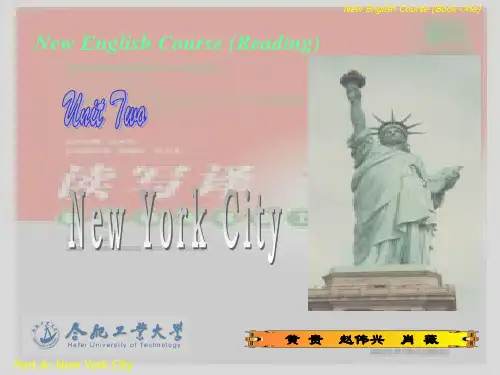
Unit2 FriendshipPeriod: 2Teaching Content: Unit2 Friendship(1)Listening and Speaking /Reading Text AAims of Teaching1. To improve the listening and speaking abilities of Ss’2. To improve Ss’ reading ability.Main points in teaching1. Understand the main ideas of Text A and master the useful sentence structures, words and expressions.2. Develop ss’ basic language skills by listening and speaking.Difficult points in teachingUnderstanding of some difficult sentencesTeaching procedures:The first lessonStep1 Lead-inFriendship is like an everyday necessity to us and we cannot live without friends. As friends, we should be honest, royal, reliable and helpful to each other and we should not deceive or betray each other, but believe, respect, understand and appreciate each other. We should also be warm-hearted, enthusiastic, generous and helpful to each other especially when our friends are in trouble.A true friend never cares about our possessions or social status. He or she may live far away from us, but emotionally he or she is very close to us. So, we can chat about everything and share our happiness and hardships with them. In this way, we can fully enjoy our life so that we will feel that our world is getting more and more beautiful and attractive.We hope we can have as many friends as we can, because the more friends we have, the happier we will be.Step2ListeningActivity 1 Sound RecognitionActivity 2 ConversationActivity 3 PassageQuestions and Answers1. Q: What can we know about Mr. Black from the passage?A: He was a very nice doctor.2. Q: Why did people like him and believe him?A: Because he was always ready to help his patients.3. Q: Why did people go to see other doctors when Black was old?A: Because his memory became weak.4. Q: What did people worry about if they went to see him?A: He might give them wrong medicine.5. Q: How did people make him happy when they did not go to see him?A: They told him that there were no patients then.Step3 SpeakingActivity 1A: What time is it now?B: Sorry, I don’t know it exactly.A: Why?B: Because my watch is 4 minutes slow.A: Then what time is it by your watch?B: It’s 7:08 a.m..A: Thank you.B: You’re welcome.Activity 2A: Would you please tell me how to ask about the time politely?B: Yes. There’re several ways of doing that.A: Tell me something about it, would you?B: Yes. First, I think, we’ll have to ask in a polite way, such as “Would you please tell me what time is it now?”A: Oh, I see. We should express ourselves by using some special words or sentence patterns.B: That’s right. Besides, we should express ourselves with some polite body language, such as smiling or nodding, etc.A: I’ve learned a lot from what you said. Thank you.B: You’re welcome.The second periodStep4 ReadingLead-in Activity DiscussionSamplesTrue friendship is a shoulder to rely on, a hand to hold, an ear to listen to your pain or someone to catch you when you fall. I quite agree with this statement. As an English proverb says, a friend in need is a friend in deed. If I feel sad, my friend can listen to me and give me support so that I can have great courage to go on with my work.True friendship is a caring voice, a comforting presence, a sentimental embrace (伤感时拥抱) or someone to wipe away tears. I think there is something in this saying.I think friends should share happiness and hardship. Every people need others’ help. It’s very good to get others’ help when we are in trouble. For example, we’ll feel much better if we can hear a caring voice w hen we’re sad.It’s very difficult for us to get a true friend in our life. If we get a true friend, we’ll be very happy and we should cherish it very much. We can talk with each other about our study and life, share happiness and hardship with each other so that we can improve our friendship.Step 5: Fast reading1 Ask ss to read Text A as fast as they can and to get the general idea of the passage. Then finish the “reading comprehension” on p322. Close books and concentrate on the recording of Text A3. Read the text aloudStep6 Homework1. Recite the new words on Text A and understand Text A2. Finish off Exs on p34-37Reflection on TeachingPeriod: 2Teaching Content: Unit2 Friendship (2)Reading Text A Grammar/Translation and WritingAims of Teaching:1. To develop ss’ ability of understanding a passage2. To learn some basic knowledge of translationMain points of Teaching:1. The usage of some words and expressions2. Understand the main ideas of Text ATeaching difficult points:Some difficult sentencesTeaching procedures:The first periodStep1 Everyday Report by studentsStep2 Explain the exercisesAsk some students to write their answers on the blackboard, then check the answers with the whole class.Step3 The main idea of Text ADivide the class into seven groups, and ask them to discuss the main idea of the passage. Then let some groups to express their opinions.Step4 Language pointshighest form of human relationshipexactly the samekey to opening upon everythingelse's done is done7. practice respect forhis or her ownfocused onbehind your backThe second periodStep5 Translation and WritingKnow about translation: How to choose the right meaning of a word. As we all know, each English word has more than one meaning, which means it has different meaning when in different situations. So, selecting the suitable meaning to express is of great importance while translating.Step6 Finish the Ex on p43.Key to the exercise1.我们的飞机降落在杭州萧山机场。
Unit 2Section A: The Opera SingerTeaching Objectives:1. 理解课文A 和B 的文章大意,学习音乐家不懈努力追求完美艺术的高尚精神。
2. 理解和正确运用重点词汇、短语、主谓宾补句型、被动语态和疑问句。
3. 掌握两个易混淆元音/e/ 和/ æ/ 的不同发音。
4. 学会正确使用名词。
5. 了解乐曲《高山流水》的由来,学习古人珍惜友谊的高尚情操。
Teaching Procedures:Part 1: Warm-up Activities1. Matching:Learn the following words about different kinds of musical instrument, and match them to the pictures.2. Listen to the conversation. Then practice with your partner, using the words and phrases provided on the right.Part 2: Text A: The Opera SingerⅠ. Background Information1. Pedro Pablo SacristanPedro Pablo Sacristan (1973– ), was born in Madrid. He was the second of six children and studied at the private school where his father worked as an athletic trainer. Despite being part of a very modest family, he had a good education in an atmosphere of deep Christian roots. Bedtime Stories is a project that combines his great love for writing stories, a disguised vocation for education and deep knowledge in the fields of technology.2. History of operaOpera, whose name comes from the Italian word work, is an art form in which singers and musicians perform a dramatic work combining text and musical score, usually in a theatrical setting. Opera is part of the Western classical music tradition. It started in Italy at the end of the 16th century and soon spread throughout the rest of Europe.Ⅱ. Words and phrases1. mattera. v. be important 有关系;要紧What does it matter whether he comes or goes? 他是来是去,又有什么关系呢?b. n. affair, topic or situation being considered 事情;问题;情况It’s no laughing matter. 这可不是闹着玩的。
2. cleara. v. remove sth. that is blocking sth. else or causing a problem 清理He cleared his throat and began singing. 他清了清嗓子开始唱起来。
b. a. expressed in a simple and direct way so that people understand 清楚的;明确的The question was not very clear. 这个问题并不十分清楚。
3. unfaira. not right or just 不公正的;不公平的Many employers have recognized that age discrimination is unfair.许多雇主已经认识到年龄歧视是不公平的。
4. considerv. think about sth. carefully or have a particular opinion 考虑;认为We have considered your application carefully, but cannot offer you the job.我们仔细地考虑了你的申请,但是不能给你提供这份工作。
5. treatv. behave towards sb. or sth. in a particular way 对待;看待The prisoners were well treated by their guards. 囚犯受到看守很好的对待。
6. disdaina. n. a complete lack of respect 鄙视;轻视She watched me with disdain. 她轻蔑地看着我。
b. v. have no respect for sb. or sth. 鄙视;轻视Childcare was seen as women’s work, and men disdained it.照看儿童被认为是女人的事,男人对此很不屑。
7. spreada. v. affect more people/places; become known about or used by more and more people 扩散;蔓延;流传Fire quickly spread through the building. 火势在楼房里迅速蔓延。
b. n. the fact or process of spreading over an area 传播;蔓延There is an attempt to stop the spread of nuclear weapons. 有终止核武器扩散的意向。
8. advertisev. tell the public about a product or service in order to persuade them to buy it; make an announcement that a job is available or an event is happening or going to happen 做广告;宣传;公布9. interviewa. v. ask sb. questions about their life, opinions, etc., especially on the radio or TV or for a newspaper or magazine; ask sb. questions, especially at a formal meeting, in order to find out whether they are suitable for a job, course of study, etc. 采访;面试I seized the chance to interview Chris Hani about this issue. 我抓住机会就这个问题采访克里斯•哈尼。
10. interviewb. n. an occasion when sb. is asked questions about their life, opinions, etc., especially on the radio or TV or for a newspaper or magazine; a formal meeting at which sb. is asked questions in order to find out whether they are suitable for a job, course of study, etc. 采访;访谈;面试There’ll be an interview with Mr. Brown after the news. 新闻之后将会有一个对布朗先生的采访。
11. rather thanin preference to; instead of 而不愿;而不要;而不是I think I’ll have a cold drink rather than a coffee. 我想喝杯冷饮,不想喝咖啡。
12. courtesyn. polite behavior and respect for other people 有礼的举止;礼貌He didn’t even have the courtesy to call and say he couldn’t come.他甚至连打个电话说一声他不能来的礼貌都没有。
13. at all hoursat any hour; at any time 在任何时间If you have a problem, you know you can call at all hours. 如您有任何问题,可以随时来电咨询。
14. toura. n. a journey for pleasure; a planned journey made by musicians, a sports team, etc. in order to perform or play in several places 旅游;旅行;巡回演出He told me about his ten-day tour of France. 他告诉了我他为期十天的法国之旅。
b. v. visit several parts of a country or area 旅游;观光We are touring the Greek islands this summer. 我们今年夏天去希腊的海岛旅游。
15. suspecta. v. think that sth. is probably true, especially sth. bad 猜想;怀疑I suspected that there was something wrong with the engine. 我怀疑发动机出了什么故障。